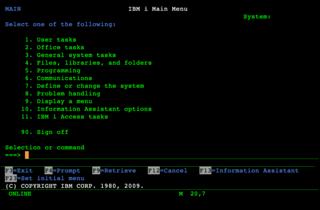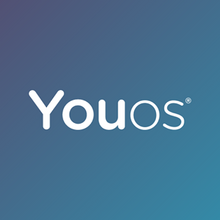
A graphical user interface, or GUI, is a form of user interface that allows users to interact with electronic devices through graphical icons and visual indicators such as secondary notation. In many applications, GUIs are used instead of text-based UIs, which are based on typed command labels or text navigation. GUIs were introduced in reaction to the perceived steep learning curve of command-line interfaces (CLIs), which require commands to be typed on a computer keyboard.
An integrated development environment (IDE) is a software application that provides comprehensive facilities for software development. An IDE normally consists of at least a source-code editor, build automation tools, and a debugger. Some IDEs, such as IntelliJ IDEA, Eclipse and Lazarus contain the necessary compiler, interpreter or both; others, such as SharpDevelop and NetBeans, do not.

Solaris is a proprietary Unix operating system originally developed by Sun Microsystems. After the Sun acquisition by Oracle in 2010, it was renamed Oracle Solaris.
The history of macOS, Apple's current Mac operating system formerly named Mac OS X until 2011 and then OS X until 2016, began with the company's project to replace its "classic" Mac OS. That system, up to and including its final release Mac OS 9, was a direct descendant of the operating system Apple had used in its Mac computers since their introduction in 1984. However, the current macOS is a UNIX operating system built on technology that had been developed at NeXT from the 1980s until Apple purchased the company in early 1997.

Xandros, Inc. was a software company which sold Xandros Desktop, a Linux distribution. The name Xandros was derived from the X Window System and the Greek island of Andros. Xandros was founded in May 2001 by Linux Global Partners. The company was headquartered in New York City with its development office in Ottawa, Canada.

IBM i is an operating system developed by IBM for IBM Power Systems. It was originally released in 1988 as OS/400, as the sole operating system of the IBM AS/400 line of systems. It was renamed to i5/OS in 2004, before being renamed a second time to IBM i in 2008. It is an evolution of the System/38 CPF operating system, with compatibility layers for System/36 SSP and AIX applications. It inherits a number of distinctive features from the System/38 platform, including the Machine Interface, the implementation of object-based addressing on top of a single-level store, and the tight integration of a relational database into the operating system.
C++Builder is a rapid application development (RAD) environment for developing software in the C++ programming language. Originally developed by Borland, as of 2009 it is owned by Embarcadero Technologies, a subsidiary of Idera. C++Builder can compile apps for Windows, iOS, macOS, and Android. It includes tools that allow drag-and-drop visual development, making programming easier by incorporating a WYSIWYG graphical user interface builder.
Virtual PC is an x86 emulator for PowerPC Mac hosts and a virtualization app for Microsoft Windows hosts. It was created by Connectix in 1997 and acquired by Microsoft in 2003. The Mac version was discontinued in 2006 following the Mac transition to Intel, while the Windows version was discontinued in 2011 in favour of Hyper-V.
An application program is a computer program designed to carry out a specific task other than one relating to the operation of the computer itself, typically to be used by end-users. Word processors, media players, and accounting software are examples. The collective noun "application software" refers to all applications collectively. The other principal classifications of software are system software, relating to the operation of the computer, and utility software ("utilities").
Object Pascal is an extension to the programming language Pascal that provides object-oriented programming (OOP) features such as classes and methods.
Workspace is a term used in various branches of engineering and economic development.

TrueOS is a discontinued Unix-like, server-oriented operating system built upon the most recent releases of FreeBSD-CURRENT.

Aptana, Inc. is a company that makes web application development tools for use with a variety of programming languages. Aptana's main products include Aptana Studio, Aptana Cloud and Aptana Jaxer.

Adobe AIR is a cross-platform runtime system currently developed by Harman International, in collaboration with Adobe Inc., for building desktop applications and mobile applications, programmed using Adobe Animate, ActionScript, and optionally Apache Flex. It was originally released in 2008. The runtime supports installable applications on Windows, macOS, and mobile operating systems, including Android, iOS, and BlackBerry Tablet OS.

Parallels Desktop for Mac is software providing hardware virtualization for Macintosh computers with Intel processors, and since version 16.5 also for Apple silicon-based Macintosh computers. It is developed by Parallels, since 2018 a subsidiary of Corel.
Morfik Technology Pty Ltd. is an Australian software company that was acquired by Altium in 2010.
The Online Operating System was a fully multi-lingual and free to use web desktop written in JavaScript using Ajax. It was a Windows-based desktop environment with open-source applications and system utilities developed upon the reBOX web application framework by iCUBE Network Solutions, an Austrian company located in Vienna.
Basic4ppc is a programming language originally for Pocket PC handheld computers running Windows Mobile operating system, by Anywhere Software. Since 2014, B4x was renamed, and currently, 2023, supports multiple devices and their OS, including desktop and mobile solutions with development adaptions for these environments. The language is based on a BASIC-like syntax, taking advantage of Microsoft's .NET technology, to allow additional libraries, graphical user interface design of windows forms, rapid application development (RAD), and .NET framework compatible compilation. The language implements a unique way of adding objects to a program without being object-oriented. Its advantages are simplicity, development pace and the integration with .NET framework. A special version of the integrated development environment (IDE) allows developing straight onto the Windows Mobile device or. With the demise of Windows Mobile operating system and the devices running it Basic4PPC came to the end of its life in about 2012. For owners of Basic4PPC it remains a useful Windows-desktop BASIC compiler as it runs code directly in the Windows environment and it can compile a project to a Windows 'exe' file for use as a Windows program.
Mbed is a development platform and operating system for internet-connected devices based on 32-bit ARM Cortex-M microcontrollers. The project is collaboratively developed by Arm and its technology partners.

The Xojo programming environment and programming language is developed and commercially marketed by Xojo, Inc. of Austin, Texas for software development targeting macOS, Microsoft Windows, Linux, iOS, Android, the Web and Raspberry Pi. Xojo uses a proprietary object-oriented language.









